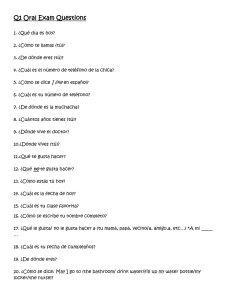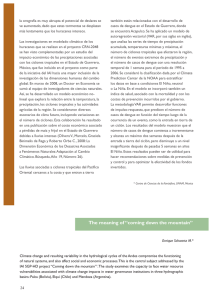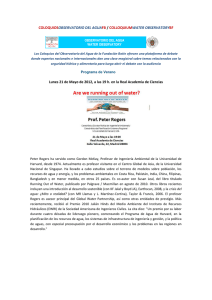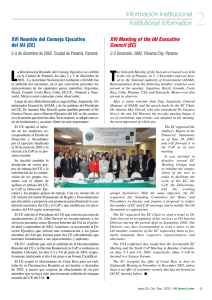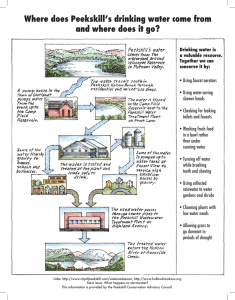Climate risk and water security Riesgos climáticos y seguridad hídrica
Anuncio
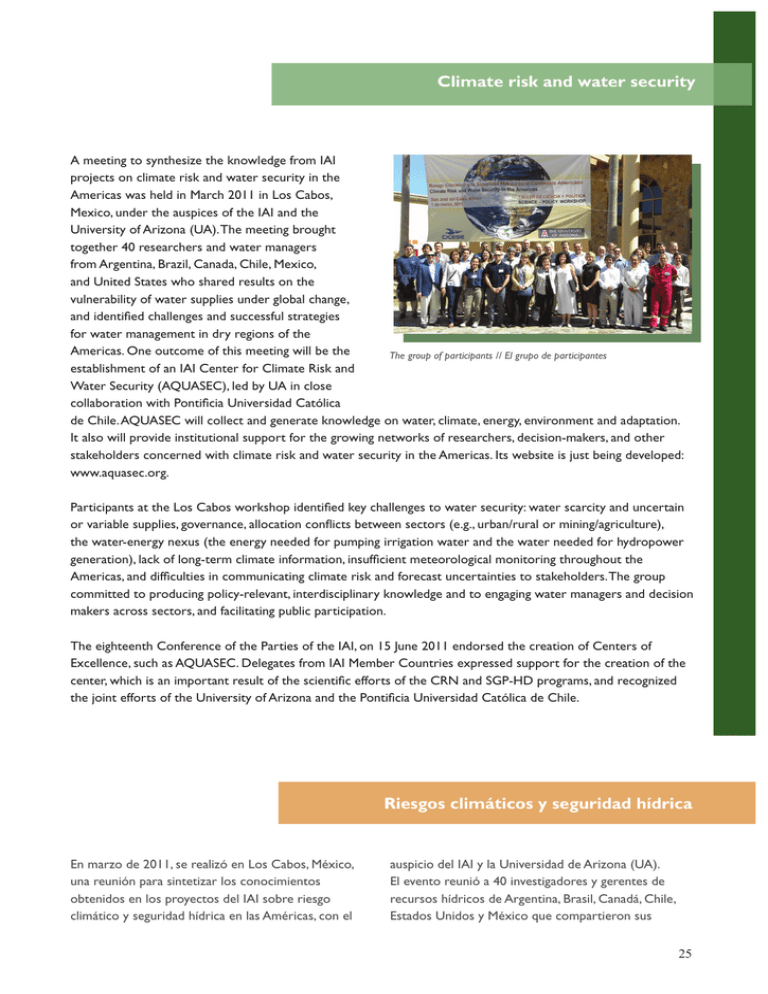
Climate risk and water security A meeting to synthesize the knowledge from IAI projects on climate risk and water security in the Americas was held in March 2011 in Los Cabos, Mexico, under the auspices of the IAI and the University of Arizona (UA). The meeting brought together 40 researchers and water managers from Argentina, Brazil, Canada, Chile, Mexico, and United States who shared results on the vulnerability of water supplies under global change, and identified challenges and successful strategies for water management in dry regions of the Americas. One outcome of this meeting will be the The group of participants // El grupo de participantes establishment of an IAI Center for Climate Risk and Water Security (AQUASEC), led by UA in close collaboration with Pontificia Universidad Católica de Chile. AQUASEC will collect and generate knowledge on water, climate, energy, environment and adaptation. It also will provide institutional support for the growing networks of researchers, decision-makers, and other stakeholders concerned with climate risk and water security in the Americas. Its website is just being developed: www.aquasec.org. Participants at the Los Cabos workshop identified key challenges to water security: water scarcity and uncertain or variable supplies, governance, allocation conflicts between sectors (e.g., urban/rural or mining/agriculture), the water-energy nexus (the energy needed for pumping irrigation water and the water needed for hydropower generation), lack of long-term climate information, insufficient meteorological monitoring throughout the Americas, and difficulties in communicating climate risk and forecast uncertainties to stakeholders. The group committed to producing policy-relevant, interdisciplinary knowledge and to engaging water managers and decision makers across sectors, and facilitating public participation. The eighteenth Conference of the Parties of the IAI, on 15 June 2011 endorsed the creation of Centers of Excellence, such as AQUASEC. Delegates from IAI Member Countries expressed support for the creation of the center, which is an important result of the scientific efforts of the CRN and SGP-HD programs, and recognized the joint efforts of the University of Arizona and the Pontificia Universidad Católica de Chile. Riesgos climáticos y seguridad hídrica En marzo de 2011, se realizó en Los Cabos, México, una reunión para sintetizar los conocimientos obtenidos en los proyectos del IAI sobre riesgo climático y seguridad hídrica en las Américas, con el auspicio del IAI y la Universidad de Arizona (UA). El evento reunió a 40 investigadores y gerentes de recursos hídricos de Argentina, Brasil, Canadá, Chile, Estados Unidos y México que compartieron sus 25 resultados sobre la vulnerabilidad de los recursos hídricos ante el cambio global, e identificaron desafíos y estrategias exitosas para el manejo del agua en regiones secas de las Américas. Una de las consecuencias de la reunión es la creación de un Centro del IAI sobre Riesgo Climático y Seguridad Hídrica (AQUASEC), que será dirigido por la UA, en estrecha cooperación con la Pontificia Universidad Católica de Chile. AQUASEC colectará y generará conocimientos sobre recursos hídricos, clima, energía, ambiente y adaptación. Brindará también apoyo institucional a las crecientes redes de investigadores, tomadores de decisiones y otros actores sociales dedicados a los riesgos climáticos y la seguridad hídrica en las Américas. El sitio web está en desarrollo: www. aquasec.org. Los participantes del taller de Los Cabos identificaron retos clave para la seguridad hídrica: la escasez de agua y su provisión incierta o variable, la gobernanza, los conflictos por el agua entre distintos sectores (por ejemplo, urbano/rural o minería/agricultura), el vínculo agua-energía (la energía necesaria para el bombeo de agua para riego y el agua necesaria para la generación de energía hidroeléctrica), la falta de información climática de largo plazo, la insuficiente monitorización meteorológica en las Américas, así como las dificultades en comunicar los riesgos climáticos y las incertidumbres de los pronósticos a los actores sociales. El grupo se comprometió a producir conocimientos científicos interdisciplinarios y de relevancia política, a involucrar a gerentes de recursos hídricos y tomadores de decisiones de diferentes sectores y a facilitar la participación del público. El 15 de junio de 2011, la Decimoctava Conferencia de las Partes del IAI reconoció la creación de Centros de Excelencia, como AQUASEC. Los delegados de los países miembros del IAI manifestaron su apoyo a la creación del centro, que es un importante resultado de los esfuerzos de los programas CRN y SGP-HD, y reconocieron los esfuerzos de la Universidad de Arizona y la Pontificia Universidad Católica de Chile. Global change: regional solutions, sciences and collaborations In March 2011, the Argentinean Ministry of Science, Technology and Productive Innovation (Mincyt), jointly with the IAI, organized a meeting with representatives from the embassies of IAI member countries and of those European countries with which Argentina has research agreements. The event showed how global change research programs sponsored by the IAI benefit Argentina, the region and its researchers. One of the highlighted aspects was the impact of research beyond the academic environment. Since IAI funded science is interdisciplinary and its results must be accessible to diverse audiences, initially scientists see these communication efforts as a burden and imposition. However, as they experience the effects and importance of their work beyond scientific disciplines and learned journals, they get enthusiastic. The meeting provided examples of how science can respond appropriately to societal needs for knowledge on the changes that are taking place in the world. Researchers from three collaborative research networks based in Argentina presented their results and applications in commercial activities, such as agriculture and fisheries, or in the planning of water use for hydropower generation and human consumption. The IAI promotes the global change research that no country can undertake on its own, but its results benefit each of the countries participating in the projects and the region as a whole. Moreover, the innovative approach and the interactions with different stakeholders make it possible for projects to identify the opportunities that arise from global change as well as the possibilities for adaptation and mitigation while supporting regional development. 26
